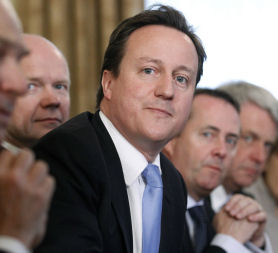Cameron defends election reform plans
Updated on 14 May 2010
During his first visit to Scotland as prime minister, David Cameron defends plans to make it more difficult to force a general election which even some of his own MPs oppose.

Under the plans for fixed-term parliaments, the only way to call a general election before the end of the five year term would be for 55 per cent or more of MPs to vote in favour of dissolving parliament.
The proposed change forms part of the coalition deal negotiated between the Conservatives and Liberal Democrats.
But the power-sharing deal showed signs of strain, as some of Mr Cameron's own Conservative backbench MPs joined the opposition building against the change.
During a visit to the Scottish parliament, Mr Cameron responded: "I'm the first prime minister in British history to give up the right unilaterally to ask the Queen for a dissolution of parliament. This is a huge change in our system, it is a big giving up of power.
"Clearly, if you want a fixed term parliament, and many people have spoken about the need for it, you have to have a mechanism to deliver it. Obviously that is a mechanism that can be debated in the House of Commons, it can be discussed, but I believe it is a good arrangement to give a strong and stable government."
Don't understand the rule changes?
Channel 4 News explains what they are and why they have prompted such strong opposition.
Backbench opposition
As the new Conservative and Liberal Democrat cabinet met for the first time yesterday, some senior Tory and Labour MPs voiced concern over the proposal.
Today Charles Walker became the first Tory MP to speak out publicly against the plan saying it was a threat to the "primacy of Parliament" which was simply being introduced for the "convenience" of the Lib-Con coalition.
His views were echoed by veteran Conservative Richard Ottaway, who is one of the frontrunners for the chairmanship of the Conservatives' 1922 Committee of backbenchers.
Mr Ottaway, MP for Croydon South, said: "It's constitutionally incoherent. Unless it can be clarified, it's not acceptable."
Leader of the Commons, Sir George Young, also defended the plans. In an article on the Conservativehome website, he wrote: "The proposal is not for a fixed term for the government; but for parliament. It makes it harder for the prime minister to call a snap election for his partisan interest and instead ensures that the decision is in the hands of MPs."
More Channel 4 News coverage of the coalition government:
- Who Knows Who: the coalition cabinet
- Does 'new politics' mean more Oxbridge males?
- Coalition deal: the winners and losers
The proposals would represent a radical shift away from the Commons tradition that a simple majority of one would be enough on a no confidence vote to force an unpopular government to resign.
The 55 per cent threshold means that Prime Minister Cameron could survive at the head of a minority Conservative government even if the Lib Dems pulled out of the coalition deal.
It would need a significant rebellion by disaffected Tories joining force with all the opposition MPs to force him to call another election.
With 306 MPs - likely to be 307 after the delayed election in Thirsk and Malton on 27 May - the Conservatives have just over 47 per cent of MPs. That means the combined weight of all the other parties could not reach the proposed 55 per cent threshold on their own.
Labour MPs have condemned the plan which is seen as an attempt to change long-standing Commons rules in the new government's favour. They have been joined by several senior Conservatives on the libertarian wing of the party who are lobbying behind-the-scenes for the 55 per cent threshold to be removed before the legislation is introduced in the Commons.
Labour's former ministers have called the plan "profoundly anti-democratic" and a "stitch-up".
'Respect' for Scotland
The prime minister travelled to Edinburgh to meet with First Minister Alex Salmond and opposition party leaders. He was accompanied by the new Scottish secretary, Lib Dem Danny Alexander.
Mr Alexander is one of 11 Lib Dem MPs in Scotland while the Tories only have one, having failed to break through in any of the other 10 seats they were targeting in the election.
A spokesman for Mr Salmond said talks would focus on the economic recovery.
The prime minister spoke to an audience of MSPs, staff and the media after meeting opposition party leaders. He said: "I believe Scotland deserves that respect and I want to try to win Scotland's respect as the Prime Minister of the United Kingdom.
"If the Scottish Parliament would wish it I would appear at the SP every year to answer questions."
Mr Cameron avoided angry protests outside the Scottish parliament in Edinburgh by entering the building through the car park.
Coalition appointments
Kenneth Clarke was sworn in as Lord Chancellor earlier today in full ceremonial ropes, including a full wig and black and gold attire, but without the customary suede shoes. Mr Clarke, a lawyer himself, said he was "honoured" to take up the role.
At the same ceremony MPs Dominic Grieve QC and Edward Garnier QC were sworn in as Attorney General and Solicitor General respectively.
Earlier, more ministerial appointments were unveiled as the prime minister finalises the coalition government.
Downing Street published a list of 30 appointments across Whitehall departments yesterday, mainly at minister of state level. Conservative Chris Grayling, who was shadow home secretary until the general election, will serve under Iain Duncan Smith at Work and Pensions. Six Liberal Democrats were also handed middle-ranking ministerial positions.
The latest appointments included five women - two of them peers - amid ongoing criticism of the male-dominated make-up of the power-sharing administration.





